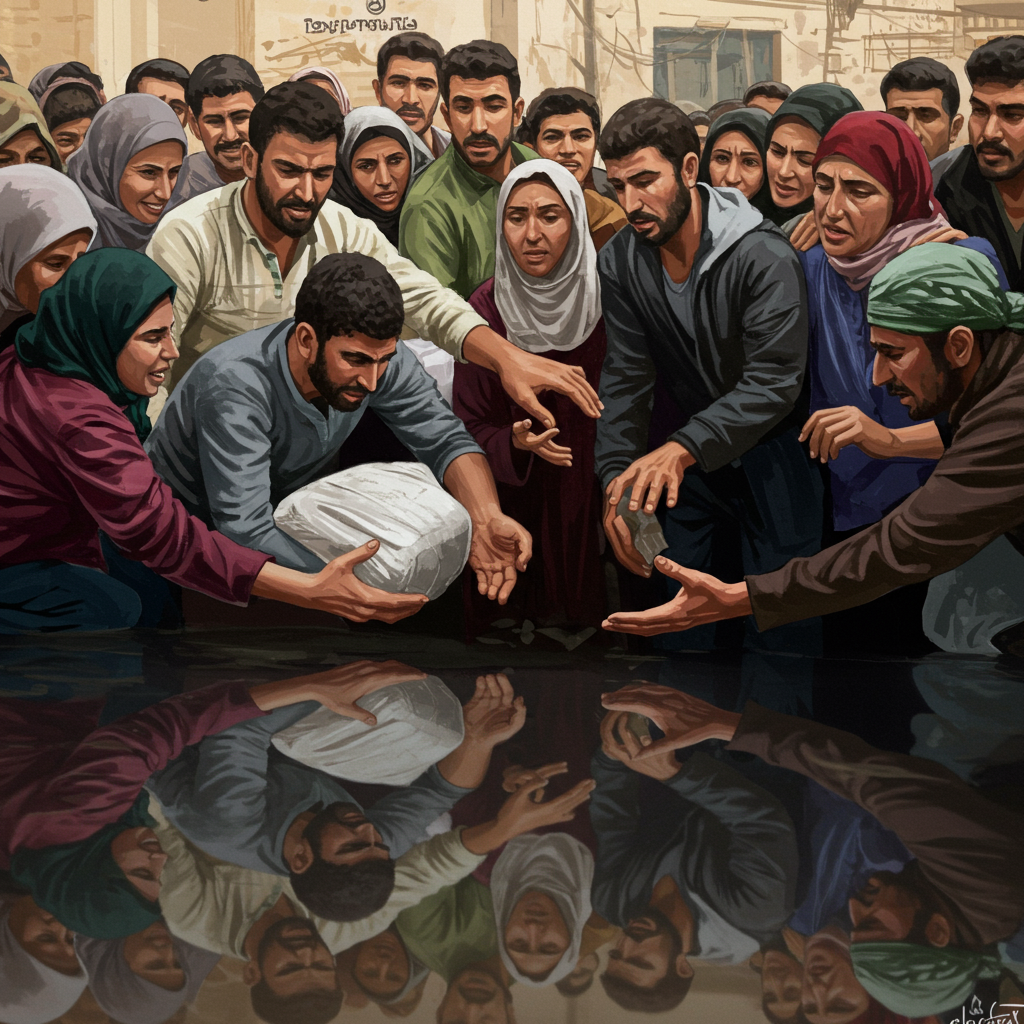The Gaza Strip faces an escalating humanitarian catastrophe, with a devastating famine officially declared as Israeli military actions continue to claim lives and hinder crucial aid deliveries. Recent reports confirm at least 51 Palestinian deaths from Israeli attacks in a single day, while a deepening hunger crisis has tragically led to eight more fatalities from malnutrition, including two children. This unfolding disaster underscores a critical global concern for the besieged territory, where international bodies and health authorities are desperately calling for immediate intervention to prevent further loss of life and alleviate what the UN Secretary-General has termed a “man-made disaster.”
Gaza’s Dual Crisis: Attacks and Starvation
The humanitarian situation in Gaza has reached a dire peak, marked by a dual crisis of relentless military operations and a rapidly spreading famine. Medical sources reported a single day’s toll of 51 Palestinians killed in various Israeli attacks across Gaza. Among these tragic incidents, Israeli artillery targeted tents sheltering displaced families in the Asdaa area northwest of Khan Younis, resulting in the deaths of 16 people, including six children. In central Gaza, a drone strike on a home in the Maghazi refugee camp killed two individuals, further highlighting the widespread impact of the conflict.
The escalating violence extends to those seeking basic sustenance. Disturbingly, at least 16 Palestinians were killed while attempting to access humanitarian aid. Incidents included a Palestinian shot dead by Israeli forces near a distribution point close to the “Morag axis” southeast of Khan Younis, and another civilian killed near the Israeli-controlled Netzarim Corridor. These events paint a grim picture of a population facing lethal risks even in their desperate search for food.
The Silent Catastrophe: Famine in Gaza
Beyond the immediate conflict, a silent, pervasive tragedy is unfolding across Gaza: widespread starvation. Palestinian health authorities confirmed eight additional deaths from malnutrition within a 24-hour period, bringing the total death toll from starvation to 281 since the conflict began nearly two years ago. Shockingly, 114 of these victims are children, as stated by Munir al-Bursh, the director-general of Gaza’s Health Ministry. He described the famine as “silently ravaging the bodies of civilians, depriving children of their right to life, and turning tents and hospitals into daily scenes of tragedy.”
The gravity of the situation prompted the United Nations to officially declare a famine in Gaza, marking an unprecedented designation for the Middle East. Experts warn that 500,000 people face “catastrophic” hunger. The Integrated Food Security Phase Classification (IPC) system, a global hunger monitor, indicated that 514,000 people—nearly a quarter of Gaza’s Palestinian population—are already experiencing famine. This number is projected to surge to 641,000 by the end of September if current conditions persist. Al Jazeera’s Hind Khoudary reported from Deir el-Balah that many Palestinians feel the UN’s declaration came “very late,” having endured months of extreme hunger.
Obstruction of Aid and International Condemnation
A significant factor exacerbating the famine is the systematic obstruction of aid deliveries. The UN has explicitly accused Israel of “systematic obstruction,” with Secretary-General Antonio Guterres describing the famine as a “man-made disaster.” Philippe Lazzarini, Commissioner General of UNRWA, asserted that Israel “created” and is “denying the famine.” Amnesty International’s Erika Guevara Rosas called the declaration a “scathing indictment” of states’ failures and a “direct consequence of Israel’s deliberate campaign of starvation.”
Since May 27, Israel has implemented a unilateral aid delivery mechanism through the “Gaza Humanitarian Foundation” (GHF), backed by Israel and the US. However, this system has been rejected by the UN and major relief groups as illegitimate, violating humanitarian principles of independence and neutrality. According to Gaza’s Health Ministry, more than 2,076 Palestinians have been killed and over 15,300 wounded while seeking aid since the GHF scheme was initiated, underscoring the dangers inherent in the current distribution methods. A joint investigation by Forensic Architecture and the World Peace Foundation documented at least 64 incidents of Israeli army attacks on Palestinian civilians seeking food aid, including 25 at GHF sites, concluding that Israel is “instrumentalising aid.”
Calls for Action and Political Reactions
The escalating Gaza famine has sparked urgent appeals and a rare bipartisan alignment among US lawmakers. Senator Bernie Sanders and Representative Marjorie Taylor Greene, from opposing political spectrums, have both expressed grave concern and called for an end to US support for Israel’s military actions. Sanders urged President Trump to intervene, stating, “Enough is enough. No more American taxpayer dollars to Netanyahu’s war machine.” Greene, while justifying Israel’s war against Hamas, strongly condemned the suffering of innocent civilians, arguing that US aid makes taxpayers “complicit in Israel’s military actions.”
These calls are echoed globally. The Palestinian Health Ministry in Gaza, while appreciating the famine declaration, expressed that it was delayed. In a powerful statement, the ministry asserted that “the engineering of starvation is one aspect of the chapters of genocide, which also include the systematic destruction of the health sector and other sectors, mass killing, and the policy of exterminating generations.” The Scottish National Party (SNP) urged the UK government to impose a complete arms embargo on Israel, recognize a Palestinian state, and join the ICJ genocide case, among other measures.
Amidst these pleas, the humanitarian aid efforts continue under immense pressure. Pakistan dispatched its 19th aid shipment to Egypt for Gaza, totaling 100 tonnes of flour, ready-to-eat meals, and other essentials, bringing its cumulative relief to 1,915 tonnes. Yet, despite these efforts, the situation remains critical. The director of the Gaza health ministry urgently called for safe corridors for chronic disease medications and international medical teams, describing the situation as a “health and environmental genocide” and a “moral outrage.”
The Broader Impact and Future Projections
The current crisis unfolds within the broader context of a conflict that has seen more than 62,600 Palestinians killed in Gaza since the Hamas-led October 2023 attack on southern Israel. The human toll is staggering, with nearly all of Gaza’s population displaced and multi-billion dollar challenges ahead for reconstruction. Beyond the immediate fatalities from attacks and starvation, the long-term health consequences of severe malnutrition, particularly for children, will have profound impacts on future generations. Children not responding to treatment due to dire conditions, and over half of pregnant women and new mothers malnourished, indicate a deepening public health emergency that demands comprehensive and sustained humanitarian intervention.
The international community continues to grapple with finding a viable solution. The future governance of Gaza remains contested, with various proposals circulating, yet a consensus on how to effectively govern and rebuild the enclave remains elusive. The urgency of the famine declaration amplifies the pressure on all parties to prioritize civilian lives and ensure unfettered access for humanitarian aid.
Frequently Asked Questions
What is the current scale of the humanitarian crisis and famine in Gaza?
The humanitarian crisis in Gaza is catastrophic. A famine has been officially declared by the United Nations, the first such designation in the Middle East. Experts warn that 500,000 people face “catastrophic” hunger, with the IPC system indicating 514,000 people (nearly a quarter of Gaza’s population) are currently experiencing famine. This number is projected to rise to 641,000 by late September. Alongside this, over 281 Palestinians, including 114 children, have died from malnutrition since the conflict began, while recent Israeli attacks claimed 51 lives in a single day.
Who is responsible for obstructing humanitarian aid deliveries into Gaza?
The United Nations has explicitly accused Israel of “systematic obstruction” of aid deliveries, with Secretary-General Antonio Guterres labeling the famine a “man-made disaster.” UNRWA Commissioner General Philippe Lazzarini stated that Israel “created” and is “denying the famine.” Additionally, Israeli settlers have reportedly attacked aid convoys from Jordan. A unilateral aid delivery system (GHF) backed by Israel and the US has also been rejected by the UN and major relief groups as illegitimate, and over 2,076 Palestinians have been killed or wounded while seeking aid since its inception.
What are international bodies and political figures calling for to alleviate the Gaza crisis?
International bodies and political figures are calling for urgent, multifaceted action. The UN is demanding an immediate, at-scale response to halt the famine and ensure massive aid influx. US Senator Bernie Sanders and Representative Marjorie Taylor Greene have both urged an end to US financial and military support for Israel, citing the humanitarian crisis. The Palestinian Health Ministry in Gaza is calling for safe corridors for medications and international medical teams. The Scottish National Party (SNP) is pushing for a complete arms embargo on Israel, recognition of a Palestinian state, and joining the ICJ genocide case.
The unfolding tragedy in Gaza demands immediate and comprehensive action from the international community. The dual crisis of ongoing military operations and a deepening, man-made famine is pushing the population to the brink. With hundreds of thousands facing catastrophic hunger and a growing death toll from both violence and starvation, the calls for unimpeded aid access, a cessation of hostilities, and accountability for obstructions are more urgent than ever. The world must not turn a blind eye to this silent catastrophe.
References
- www.aljazeera.com
- www.yahoo.com
- www.dawn.com
- www.inkl.com
- <a href="https://www.democracynow.org/2025/8/7/headlines/4morepalestiniansstarvetodeathingazaasisraelisettlersattackaidconvoysfrom_jordan”>www.democracynow.org



